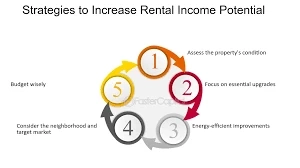How to Optimise Tax Returns for Rental Property Owners: Strategies to Maximise Income
Navigating tax returns as a rental property owner can be complex, but with the right strategies, you can significantly optimise your tax outcomes and maximise your rental income. Here are some effective tax optimisation tips for rental property owners, focusing on key deductions and planning strategies.
Claim All Allowable Deductions
One of the most effective ways to optimise your tax return is by claiming all allowable deductions. Here are some of the key deductions for rental property owners:
- Mortgage Interest – You can’t deduct the full amount of mortgage interest from your rental income. Instead, you can claim a credit for the interest paid on your rental property\'s mortgage at the basic rate of 20% and deduct it to arrive at your tax liability.
- Repairs and Maintenance - Expenses related to repairing and maintaining the property can be deducted.
- Property Management Fees - If you hire a property manager, these fees are deductible.
- Insurance Premiums - Premiums for insurance policies related to your rental property are deductible.
- Utilities - Any utility expenses paid by you can be deducted.
Plan for Rental Income and Expenses
Effective rental income tax planning can help minimise tax liability and maximise profits.
- Rental Property Income Strategies - Implement strategies to manage rental income efficiently. This could include timing the receipt of rental payments to optimise tax brackets.
- Rental Property Expenses Claim - Keep detailed records of all expenses to ensure you claim all possible deductions.
Leverage Investment Property Tax Benefits
Investment properties come with specific tax benefits that can be leveraged for tax optimisation.
- Tax Optimisation Tips - Regularly review tax laws to stay updated on new benefits and deductions.
- Investment in Property Tax Benefits – Investment in residential property is taxed at the rate of 18% for basic rate taxpayers and at 28% for higher and additional rate taxpayers for Capital Gains Tax (CGT), which is generally lower than the Income Tax rates that can go upt0 45%. Further, an annual CGT allowance of £3,000 is allowed for the tax year 2024-25.
Implement Long-Term Tax Planning Strategies
Long-term planning is crucial for optimising tax returns over the lifespan of your rental property investment.
- Capital Gains on Investment Properties - Plan for the tax implications when selling a rental property.
- Tax Implications of Rental Income - Understand how rental income affects your overall tax situation and plan accordingly.
Conclusion
By employing these strategies and staying informed on tax laws, rental property owners can optimise their tax returns, ensuring maximum income and minimum tax liability. For more detailed advice and personalised tax strategies, consider consulting with experts like those at UK Property Accountants.
FAQs
What are the allowable deductions for rental properties?
Allowable deductions include repairs and maintenance, property management fees, insurance premiums, and utilities.
How can I minimise taxes on rental income?
You can minimise taxes on rental income by claiming all allowable deductions and implementing effective rental income tax strategies.
What are the tax implications of selling a rental property?
Selling a rental property can result in capital gains tax. Planning for this by understanding the tax implications can help manage the tax burden.


